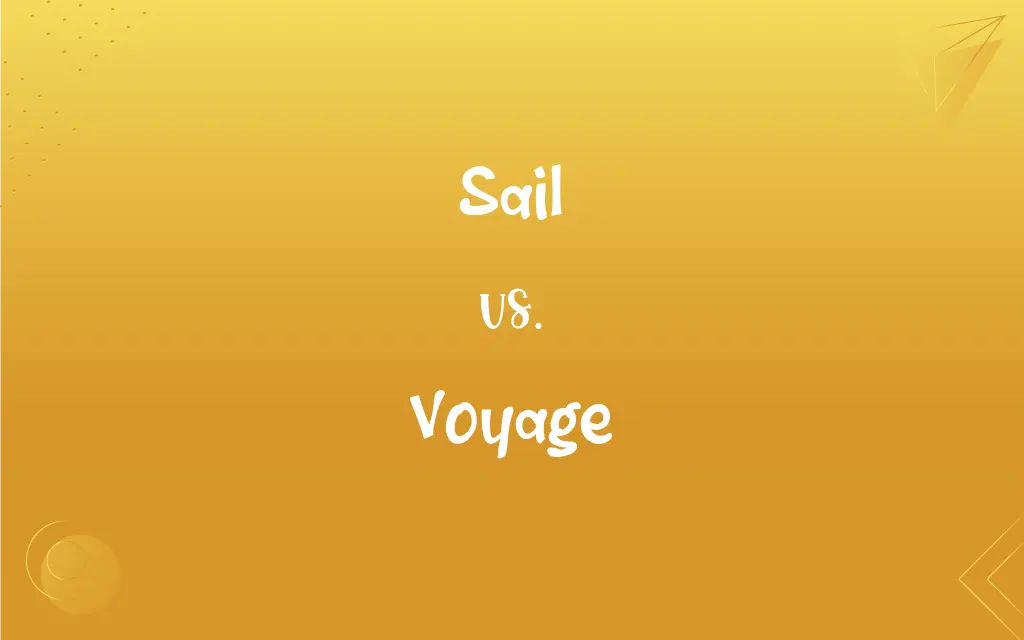Sail vs. Voyage: What's the Difference?
Edited by Harlon Moss || By Janet White || Updated on October 5, 2023
Moving by water using fabric sheets (sails); also a journey on such a vessel. A long journey involving travel by sea or in space.

Key Differences
Sail and Voyage, while seemingly synonymous due to their nautical contexts, carry discrete implications. "Sail" leans into the act or art of navigating the water using sails. It is both a noun and a verb, thus one can sail (verb) a boat or refer to the ship's sail (noun). Contrastingly, "Voyage" primarily signifies the journey itself, notably one that is longer and traverses through water or space. It does not imply the method of travel or medium, making it distinct from sail.
The word "Sail" can illustrate both the process and medium of navigation. When we examine the word 'sail' we can witness this duality: "Let's sail to the island" (verb) vs. "The sail catches the wind efficiently" (noun). Voyage relinquishes this duality, firmly placing itself as a term that encapsulates a journey, devoid of hinting at the vehicle or method used. Thus, “Voyage” concentrates on the concept and duration of a journey instead of the intricacies of navigation or vehicle anatomy.
"Sail" often associates itself with a skill set or physical entity, having layers that encompass the tangible and technique-related aspects of nautical journeys. It implies a specific mode of transport, one that involves sails and, by extension, wind. On the other hand, "Voyage" embodies an expedition or trip that is marked by its length or significance and does not dwell on the method or medium of travel, therefore making it applicable to describe travels in spacecraft as well.
Notably, "Sail" can be ingrained in the identity of the vessel or journey. A sailing ship or a sailboat is thus named because of its reliance on sails for movement. The act of sailing becomes a descriptor of the vessel, intertwining with its identity. Conversely, "Voyage" remains detached from vehicle descriptors, instead of slipping into the role of defining the journey’s length or perhaps, adventure. A "voyage" can be accomplished via varied vehicles - ships, boats, or spacecraft - without altering its fundamental meaning.
Furthermore, it’s compelling to observe the metaphorical uses of "Sail" and "Voyage". "Sail" can metaphorically convey smooth progression, e.g., "She sails through her studies effortlessly". "Voyage," metaphorically, is often employed to describe life’s long, intricate journey with its highs and lows, marking a passage through time and experiences. Both words, while concretely grounded in travel, navigate through metaphorical oceans, offering richer layers to language and expression.
ADVERTISEMENT
Comparison Chart
Basic Definition
A method/act of sea travel using sails.
A long journey, especially by sea or space.
Part of Speech
Can be both noun and verb.
Primarily used as a noun.
Length/Duration
Does not imply duration.
Implies a long journey.
Method Specificity
Specific to sail-powered vessels.
Not specific to travel method.
Metaphorical Usage
Can imply smooth progression.
Often symbolizes a lengthy, significant journey.
ADVERTISEMENT
Sail and Voyage Definitions
Sail
A piece of material extended on a mast to catch the wind.
The sail billowed as the wind blew strongly.
Voyage
The course or path taken by a long journey.
The voyage to the new world was fraught with peril and adventure.
Sail
To begin a journey by sea.
The pirates sail at dawn in search of treasure.
Voyage
To make a journey typically by sea or space.
The explorers voyaged to unknown territories in search of new lands.
Sail
To glide through smoothly and effortlessly.
Her fingers sail across the piano keys, creating a melodic tune.
Voyage
To undertake a journey of discovery or adventure.
They voyaged through dense forests and over towering mountains.
Sail
A trip on a body of water, specifically in a sailboat.
Our afternoon sail was relaxing and refreshing.
Voyage
A long journey involving travel by sea or space.
The astronaut prepared for his voyage to Mars.
Sail
A piece of fabric sewn together and fitted to the spars and rigging of a vessel so as to convert the force of the wind into forward motion of the vessel.
Voyage
A detailed account or report of a journey.
The captain kept a log of his voyages.
Sail
The sails of a ship or boat.
Voyage
A long journey to a foreign or distant place, especially by sea.
Sail
A narrow fairwater supporting the bridge of a submarine.
Voyage
Often voyages The events of a journey of exploration or discovery considered as material for a narrative.
Sail
Pl. sail or sails Nautical A sailing vessel.
Voyage
Such a narrative.
Sail
(Nautical) A trip or voyage in a sailing craft.
Voyage
To make a voyage.
Sail
Something, such as the blade of a windmill, that resembles a sail in form or function.
Voyage
To sail across; traverse
Voyaged the western ocean.
Sail
To move across the surface of water, especially by means of a sailing vessel.
Voyage
A long journey, especially by ship.
Sail
To travel by water in a vessel.
Voyage
(archaic) A written account of a journey or travel.
Sail
To start out on such a voyage or journey
Tomorrow we sail for the islands.
Voyage
(obsolete) The act or practice of travelling.
Sail
To operate a sailing craft, especially for sport.
Voyage
(intransitive) To go on a long journey.
Sail
To move along or progress smoothly or effortlessly
Sailed into the room five minutes late.
Sailed through the exam.
Sailed through the red light.
Voyage
Formerly, a passage either by sea or land; a journey, in general; but not chiefly limited to a passing by sea or water from one place, port, or country, to another; especially, a passing or journey by water to a distant place or country.
I love a sea voyage and a blustering tempest.
So steers the prudent craneHer annual voyage, borne on winds.
All the voyage of their lifeIs bound in shallows and in miseries.
Sail
To move along through the air
The ball sailed into the stands.
Voyage
The act or practice of traveling.
Nations have interknowledge of one another by voyage into foreign parts, or strangers that come to them.
Sail
To navigate or manage (a vessel).
Voyage
Course; way.
Sail
To voyage upon or across
Sail the Pacific.
Voyage
To take a voyage; especially, to sail or pass by water.
A mind foreverVoyaging through strange seas of thought alone.
Sail
(nautical) A piece of fabric attached to a boat and arranged such that it causes the wind to drive the boat along. The sail may be attached to the boat via a combination of mast, spars and ropes.
Voyage
To travel; to pass over; to traverse.
With what pain[I] voyaged the unreal, vast, unbounded deep.
Sail
The concept of a sail or sails, as if a substance.
Take in sail: a storm is coming.
Voyage
An act of traveling by water
Sail
(uncountable) The power harnessed by a sail or sails, or the use of this power for travel or transport.
Voyage
A journey to some distant place
Sail
A trip in a boat, especially a sailboat.
Let's go for a sail.
Voyage
Travel by boat on a boat propelled by wind or by other means;
The QE2 will sail to Southampton tomorrow
Sail
A sailing vessel; a vessel of any kind; a craft.
Twenty sail were in sight.
Sail
(nautical) The conning tower of a submarine.
Sail
The blade of a windmill.
Sail
A tower-like structure found on the dorsal (topside) surface of submarines.
Sail
The floating organ of siphonophores, such as the Portuguese man-of-war.
Sail
(fishing) A sailfish.
We caught three sails today.
Sail
(paleontology) an outward projection of the spine, occurring in certain dinosaurs and synapsids
Sail
Anything resembling a sail, such as a wing.
Sail
To be impelled or driven forward by the action of wind upon sails, as a ship on water; to be impelled on a body of water by steam or other power.
Sail
To move through or on the water; to swim, as a fish or a waterfowl.
Sail
To ride in a boat, especially a sailboat.
Sail
(intransitive) To set sail; to begin a voyage.
We sail for Australia tomorrow.
Sail
To move briskly and gracefully through the air.
Sail
(intransitive) To move briskly but sedately.
The duchess sailed haughtily out of the room.
Sail
To deal out (cards) from a distance by impelling them across a surface.
Sail
An extent of canvas or other fabric by means of which the wind is made serviceable as a power for propelling vessels through the water.
Behoves him now both sail and oar.
Sail
Anything resembling a sail, or regarded as a sail.
Sail
A wing; a van.
Like an eagle soaringTo weather his broad sails.
Sail
The extended surface of the arm of a windmill.
Sail
A sailing vessel; a vessel of any kind; a craft.
Sail
A passage by a sailing vessel; a journey or excursion upon the water.
Sail
To be impelled or driven forward by the action of wind upon sails, as a ship on water; to be impelled on a body of water by the action of steam or other power.
Sail
To move through or on the water; to swim, as a fish or a water fowl.
Sail
To be conveyed in a vessel on water; to pass by water; as, they sailed from London to Canton.
Sail
To set sail; to begin a voyage.
Sail
To move smoothly through the air; to glide through the air without apparent exertion, as a bird.
As is a winged messenger of heaven, . . .When he bestrides the lazy pacing clouds,And sails upon the bosom of the air.
Sail
To pass or move upon, as in a ship, by means of sails; hence, to move or journey upon (the water) by means of steam or other force.
A thousand ships were manned to sail the sea.
Sail
To fly through; to glide or move smoothly through.
Sublime she sailsThe aërial space, and mounts the wingèd gales.
Sail
To direct or manage the motion of, as a vessel; as, to sail one's own ship.
Sail
A large piece of fabric (as canvas) by means of which wind is used to propel a sailing vessel
Sail
An ocean trip taken for pleasure
Sail
Traverse or travel by ship on (a body of water);
We sailed the Atlantic
He sailed the Pacific all alone
Sail
Move with sweeping, effortless, gliding motions;
The diva swept into the room
Shreds of paper sailed through the air
The searchlights swept across the sky
Sail
Travel in a boat propelled by wind;
I love sailing, especially on the open sea
Sail
Travel by boat on a boat propelled by wind or by other means;
The QE2 will sail to Southampton tomorrow
Sail
The act of moving across water in a vessel powered by sails.
We will sail across the lake this weekend.
FAQs
Can "Voyage" be used as a verb?
Yes, "Voyage" can be used as a verb, although it’s more commonly utilized as a noun.
Does "Voyage" always refer to a nautical journey?
No, "Voyage" refers to a long journey which can be by sea, space, or occasionally, by land.
Can "Sail" refer to any kind of journey?
Typically, "Sail" refers to a journey or movement conducted via a sail-powered vessel.
Is "Sail" a noun or a verb?
"Sail" can be both a noun and a verb, depending on the usage.
Does a "Voyage" always imply a significant journey?
Generally, "Voyage" implies a journey of some length or significance, often exploratory or adventurous in nature.
Can "Voyage" refer to a daily or regular trip?
Rarely. "Voyage" usually denotes a journey of considerable length, not regular, short travels.
Can "Sail" be used metaphorically?
Yes, "Sail" can metaphorically suggest smooth movement or progression.
Can "Voyage" be used for non-physical journeys?
Yes, metaphorically it can (e.g., "a voyage of the mind").
Does "Voyage" indicate safe travels?
No, "Voyage" doesn’t imply the safety or ease of a journey.
Is "Sail" specific to the type of vessel used?
Yes, "Sail" specifically pertains to vessels propelled by sails.
Does "Sail" imply the presence of wind?
Generally, yes, since sails require wind to function as a mode of propulsion.
Does "Sail" refer to the action or the apparatus?
It can refer to both the action of sailing and the physical sails used to catch the wind.
Is "Voyage" used metaphorically?
"Voyage" can be used metaphorically to describe a long, transformative journey, often life itself.
Can "Sail" be used to describe a short trip?
Yes, "Sail" doesn’t specify journey duration and can denote short trips if the context allows.
Does "Sail" necessarily mean the journey has started?
Not always. “Sail” might also refer to future or potential journeys (e.g., "We sail at dawn").
Can "Sail" be used in a negative context?
Yes, it can be used in various contexts, including negative ones (e.g., "sail into trouble").
Can "Sail" refer to non-nautical contexts?
Rarely, though metaphorically it can be used in varied contexts (e.g., "sail through exams").
Can "Voyage" describe a stationary experience?
No, "Voyage" inherently involves movement or progression from one place to another.
Does "Voyage" require a specific start or end point?
Not specifically, but it implies substantial travel from one location to another.
Can "Voyage" refer to regular commuting?
No, "Voyage" does not typically refer to daily commuting but to longer, more substantial journeys.
About Author
Written by
Janet WhiteJanet White has been an esteemed writer and blogger for Difference Wiki. Holding a Master's degree in Science and Medical Journalism from the prestigious Boston University, she has consistently demonstrated her expertise and passion for her field. When she's not immersed in her work, Janet relishes her time exercising, delving into a good book, and cherishing moments with friends and family.
Edited by
Harlon MossHarlon is a seasoned quality moderator and accomplished content writer for Difference Wiki. An alumnus of the prestigious University of California, he earned his degree in Computer Science. Leveraging his academic background, Harlon brings a meticulous and informed perspective to his work, ensuring content accuracy and excellence.































































